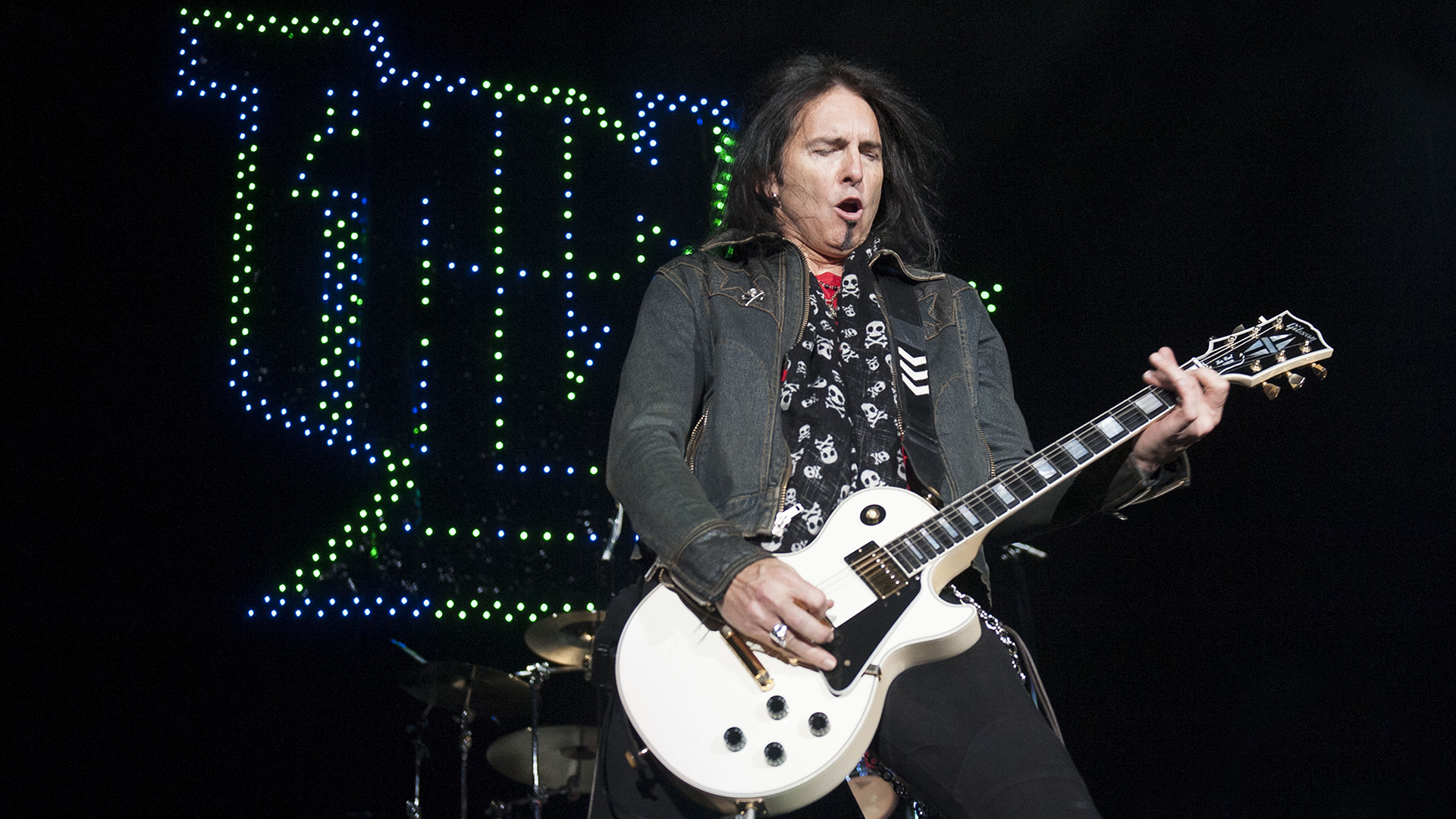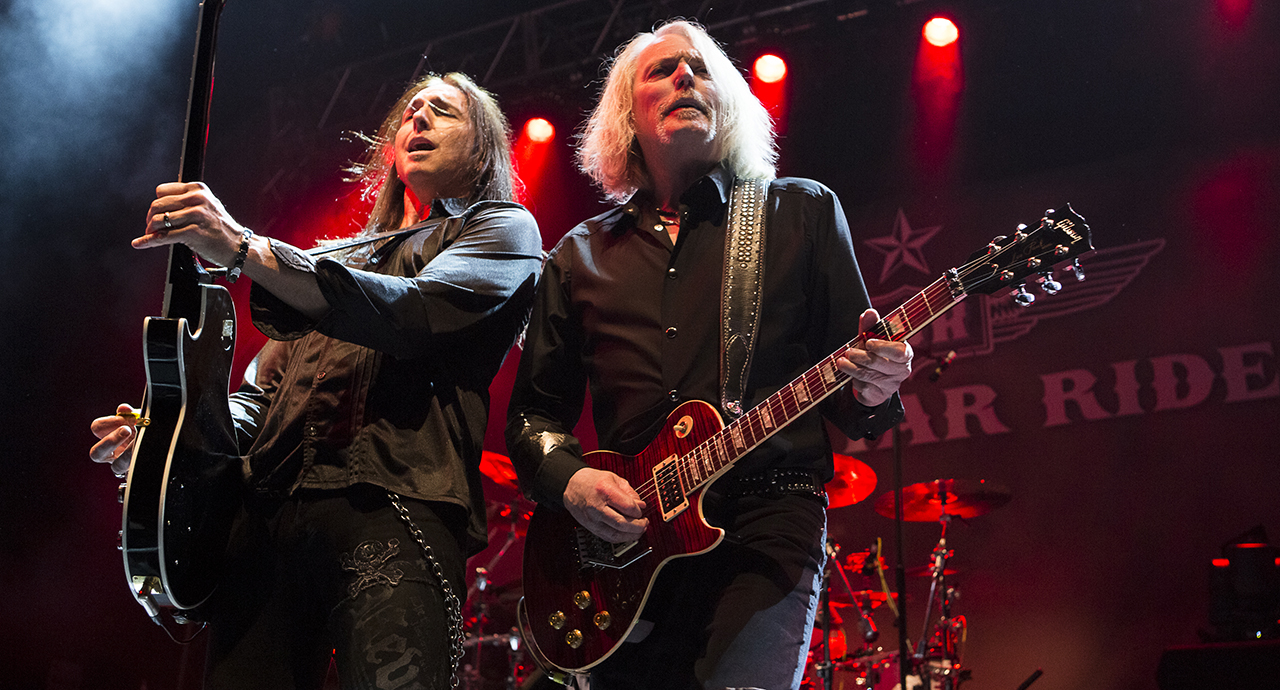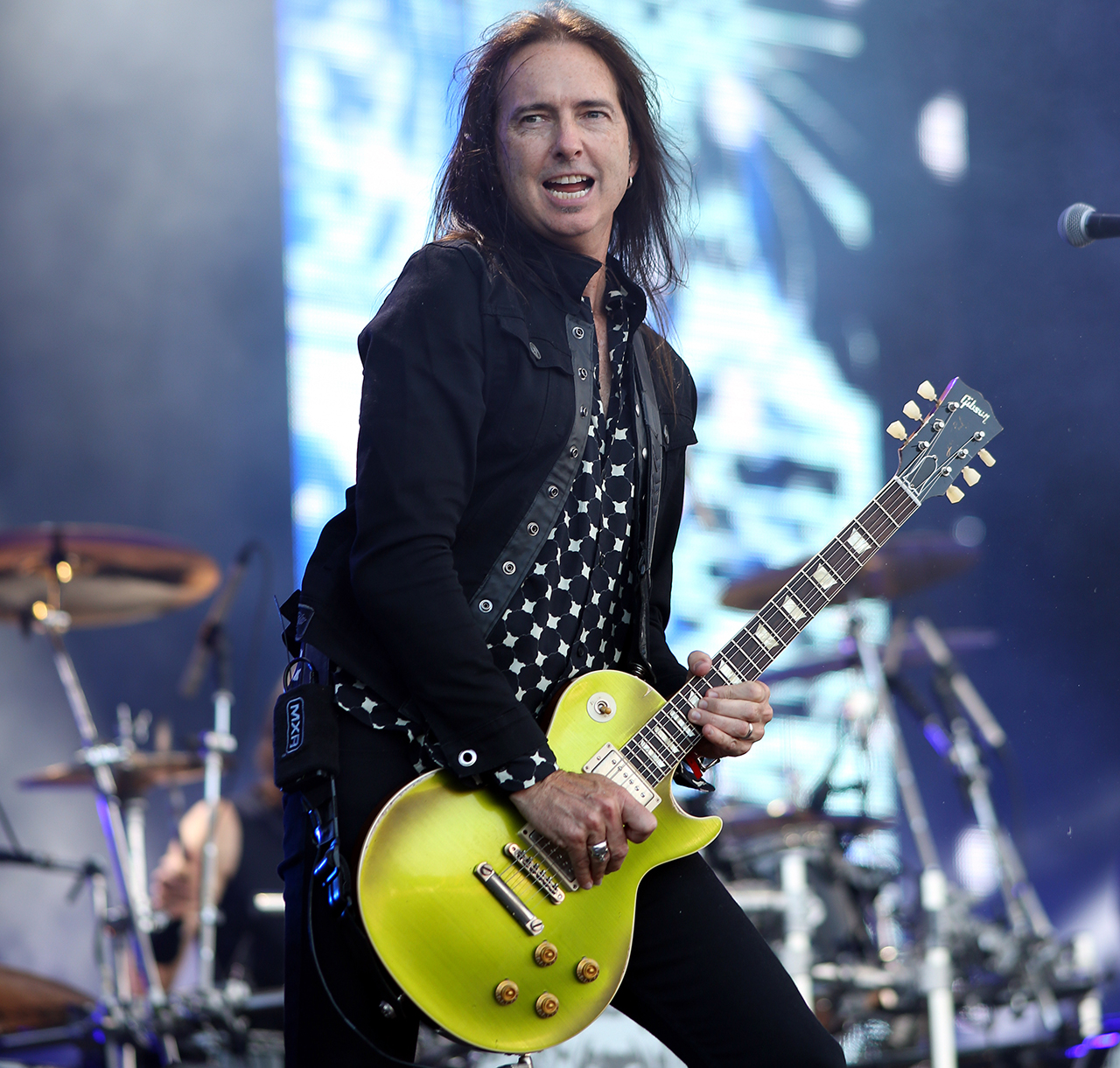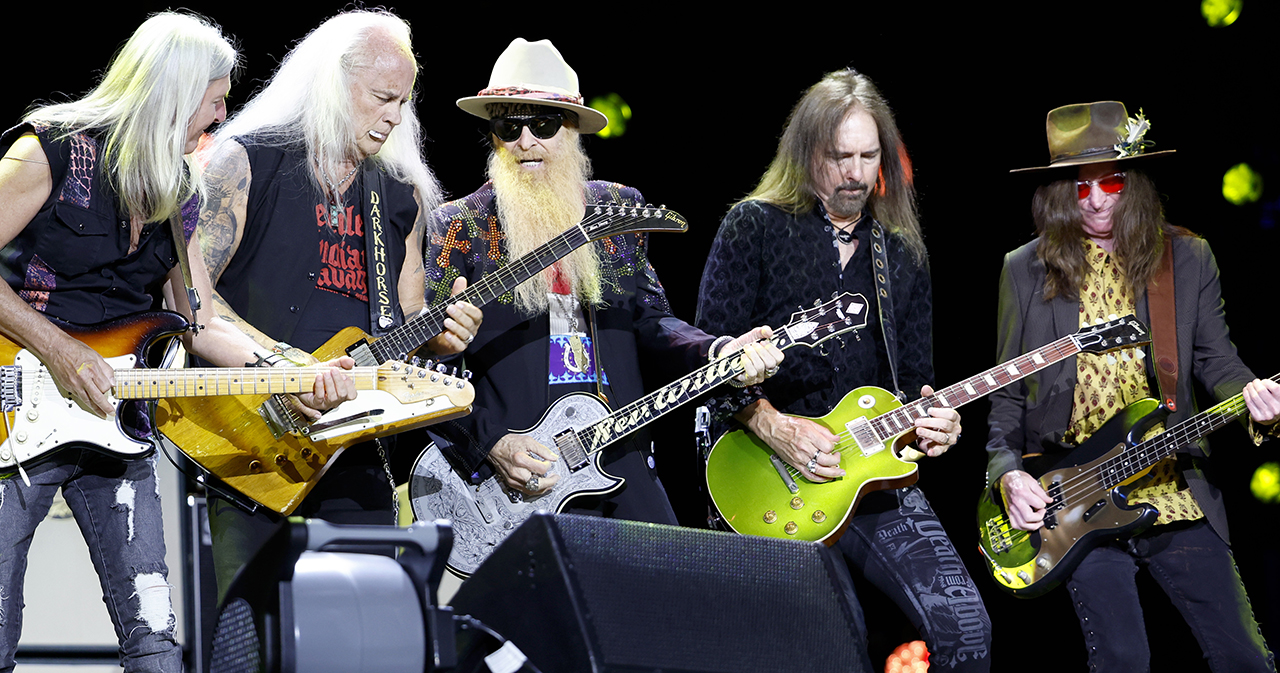“Thin Lizzy prepared me for Skynyrd. They said, ‘You need to learn these songs note for note.’ I said, ‘I wouldn’t dream of doing it any other way’”: Damon Johnson on having one of rock’s most enviable resumés – and why Eddie Van Halen gifted him a guitar
From touring with Van Halen, to finding his own niche as a blood-and-guts player with some of rock’s biggest names

Damon Johnson was born to rock. He grew up in Georgia and eventually moved to Alabama, idolizing the likes of Eddie Van Halen and even crafting his own Eddie-like Floyd Rose-equipped super Strat – before returning to his Gibson Les Paul roots.
“I guess I’m boring when it comes to gear – I just need a Les Paul,” Johnson says. “But with my band Brother Cane, I’ll step on a wah pedal every once in a while. I guess I’m officially a traditionalist. I’m very happy with that.”
After forming Brother Cane – who toured with Van Halen and Aerosmith and made waves on ‘90s rock radio – Johnson held it down with Alice Cooper, Thin Lizzy and Black Star Riders before taking on the task of replacing Gary Rossington in Lynyrd Skynyrd in 2023.
Some would jump at the chance to make the iconic Freebird solo their own – but Johnson is a purist.
“The fans want to hear those songs,” he says, “and those songs and parts are perfect. You better play the solo for Simple Man or Freebird note for note. If you play those wrong, you’ll hear about it on YouTube the next day.”
Johnson has been in the same spot with Cooper and Lizzy. But he does like to noodle now and again, and that’s where the reformed Brother Cane comes in.
“I love to improvise; I do it every day in my hotel room or at home. I get plenty of that in with Brother Cane – putting my own style down and expressing myself in my own songs.
Get The Pick Newsletter
All the latest guitar news, interviews, lessons, reviews, deals and more, direct to your inbox!
“But when it comes to these established classic rock bands, I’m a fan as much as the people in the audience. I want to give them what I’d want to hear if I were sitting in that seat.”
While Skynyrd has ongoing dates with ZZ Top, Johnson is looking to the future, which includes Brother Cane’s first studio record since 1998’s Wishpool.
“I’m getting the itch to get back into the studio, but the holes in my calendar are pretty scattered,” he reports.
“I’d love to move the Brother Cane thing forward between dates with Skynyrd. The Skynyrd thing has got control over my calendar; but I’ve got space to do other stuff, so I’m the happiest I’ve ever been. I feel very fortunate to have all of this activity going on.”
When did the guitar first enter your life?
“My dad had two Gibson guitars that he bought in 1960. He was a traveling farm equipment salesman, and an older colleague had recommended he get something to do to pass the time in hotel rooms. He had an acoustic and an electric, and my very first memory is of seeing those guitars around the house.”
What got you playing?
“They belonged to my dad, who was kind of my superhero, so the two things were connected. I was always intrigued, then I became obsessed – I’d see him play and jam with friends who came over. And my brother was a fantastic acoustic player.
In the late ‘70s, things got interesting – Aerosmith and Van Halen changed everything
“I was like, ‘Okay, anybody can do this. I can do this one day!’ When I was in grade school in the ‘70s, I discovered all this amazing rock music, and it all hit at the same time.”
Is it safe to assume that most of your early influences were classic rock?
“Kiss, Doobie Brothers, Bad Company, Lynyrd Skynyrd, Zeppelin, Sabbath and Pink Floyd. But in the late ‘70s, things got interesting – Aerosmith and Van Halen changed everything.”

You were born in Georgia but moved to Birmingham, Alabama, early in your career.
“I went from one garage band to another and even had some real gigs in bars. I sometimes set up in shopping malls just to get a little attention. In my early 20s I ended up playing in a house band four nights a week; I was really growing in confidence and belief in myself.
“One night played at a popular nightclub in downtown Birmingham. About two weeks later, a manager who had heard about the gig called and asked if I wanted to join Split the Dark, an established band. I wouldn't have been more excited if David Bowie had asked me to be his guitar player! That’s why I moved to Birmingham.”
How did Brother Cane come about?
I had a homemade guitar, a Marshall half-stack and a bunch of pedals … I even started getting into rack-mounted effects because of Steve Lukather
“Joining Split the Dark was a huge deal. Everyone in my life said, ‘You have to do this.’ I played in several bands in Birmingham – but I wasn’t the key member; I didn’t start these bands. I went back to the same manager and he offered his support if I put my own band together, which led to Brother Cane.”
What did your rig look like around that time?
“I had a homemade guitar with a Floyd Rose. It was fun, and I had a Marshall half-stack and a bunch of pedals on the floor. I even started getting into rack-mounted effects – at least, as much as I could afford, because of the influence of players like Steve Lukather.
“But in 1989 I played in a Memphis band and the other guitar player – sort of an underground legend, Eddie Shaver, the son of Billy Joe Shaver – was just gifted. When I heard that guy plug a Stratocaster straight into a Mesa Boogie head with no pedals, nothing, and get the tone he had, it changed my life.
“I took the Floyd Rose home, got my Les Paul out, and I’ve never turned back from that. The influence of Eddie, Guns N’ Roses’ Appetite for Destruction and the Black Crowes hitting right after that fueled my thinking.”
The kids at the time were going to see Smashing Pumpkins, Alice in Chains and Pearl Jam… we weren’t part of that
Is that what shaped Brother Cane’s guitar sound?
“Yes. I felt the parallels between their sound and my other influences. If the Black Crowes could get a record deal, why couldn’t I? We were just down the street in Birmingham. So it was Les Paul's and Marshall's from then on.”
Hair metal and super Strats were the flavor of the day.
“I’m proud that our reputation as an ‘80s hair band was nothing. We weren’t a grunge band; we were just a straight-ahead rock ’n’ roll band that somehow managed to etch out a little real estate on rock radio for the better part of the ‘90s.

“We were like a sub-genre, which is why we couldn’t just go out and tour with anybody. We were grateful to tour with Van Halen, Robert Plant and Aerosmith – but the kids at the time were all going to see Smashing Pumpkins, Alice in Chains and Pearl Jam.
“I get it, but we weren’t part of that, and it led to the demise of Brother Cane. We couldn’t find an infrastructure to succeed, be self-contained and make a living doing our own records. It was tough.”
We were on rock radio constantly between the summer of ’93 and the summer of ’94; it was just incredible
The first two records – Brother Cane and Seeds – held their own, with And Fools Shine On going to number one and being part of the Halloween: The Curse of Michael Myers soundtrack.
“The first record allowed us to make the second, and also the third, Wishpool. We were on rock radio constantly between the summer of ’93 and the summer of ’94; it was just incredible. Looking back, I’m still amazed that it even happened.”
What was touring with Van Halen like?
“It was the greatest experience of our lives. There’s no band I went to see more as a teenager than Van Halen. For me, nothing occupied more real estate than Van Halen. I had a bumper sticker and played every album on vinyl and cassette.
“I did my best to figure out some of Eddie’s insane alchemy. So, yeah, to get a call that we’d gotten even just a couple of opening slots with Van Halen was amazing. And that’s how it started; but Eddie, Sammy Hagar and the other guys took a shine to us and had us come for more dates when they needed an opener.”
Eddie Van Halen was super gracious – he even shipped a brand-new Peavey Wolfgang guitar to my house
Did you get to talk with Eddie much?
“Man, it was life-changing. It was amazing to get behind the curtain and become friends with all four of them. I have priceless memories of conversations and shenanigans with all those guys.
“On that tour in 1994, Eddie was sober, super clear and super focused. He was a proud parent; Wolfgang was maybe three or four then and he’d be running around the dressing room. There’s no way we could have had any idea that the kid would turn out to be what he is!

“Eddie and I would have conversations about family; I had three kids myself then. We connected on other things besides guitar. He was super gracious – he showed me his rig and his guitars and even shipped a brand-new Peavey Wolfgang guitar to my house after the tour. I still have it and I cherish it to this day.”
Did touring with Eddie – and later, Joe Perry and Aerosmith – impact your gear choices?
“My gear odyssey has been a lot of fun. My amp of choice changed after Brother Cane toured with Aerosmith in 1994, following the winter NAMM show. Joe Perry introduced me to Rick St. Pierre, who’d launched this new amp called Wizard. Rick took a real shine to me because he loved my blood-and-guts approach to playing guitar.
I’d encourage readers to research Gary Rossington’s Peavey Penta… it sounds like a big, nasty, woolly vintage Marshall
“The way I play has more in common with Angus Young and Joe Walsh than with Eddie Van Halen, who’s a technical, flashier player. I love sitting around attempting that stuff, but I tend to be more melodic. Rick recognized that and was familiar with Brother Cane, and that relationship continues today.
“The Wizard stuff was a staple of my rig through Alice Cooper, Thin Lizzy and Black Star Riders. Had it not been for my relationship with Gary Rossington and his family, and how important Gary’s amps are to Lynyrd Skynyrd’s sound, I’d be playing Wizards there too.
“But I’m currently playing Gary’s personal Peavey Penta and Magnatone amps. It’s almost like his spirit is there, and it’s such an honor for me. He ran the Peavey and the Magnatone together at the same time to give the front-of-house guy some flexibility.
“If he was playing a rhythm part he’d lean on the Magnatone, but I’d encourage readers to research Gary’s Peavey Penta – it’s badass. It sounds just like a big, nasty, woolly vintage Marshall.”
What was it like sharing space with Scott Gorham in Thin Lizzy?
I showed up the first day with Thin Lizzy beyond prepared, knowing the Gary Moore and Brian Robertson versions
“I was incredibly flattered that Scott would even ask. When it happened, Alice Cooper was the first person I called. I talked with him about how much I loved Thin Lizzy, and Alice was super supportive. I showed up the first day beyond prepared, knowing the Gary Moore and Brian Robertson versions.
“After the first couple of rehearsals Scott said, ‘Buddy, you’re playing your ass off and we love it. But don’t feel like you have to play those songs note for note. I want you to be Damon Johnson… I want you to bring your style.
“My gear has been consistent for decades. It’s not that I’m not open to other stuff, but I’m not going to Guitar Center and checking out stuff because effects have not been an essential part of any band that I’ve ever been in. But I argue that Wizard amps are some of the great amps ever made; it’s like classic Marshall adjacent.
Is that the same mindset you bring to Lynyrd Skynyrd?
“That’s how Thin Lizzy prepared me for Skynyrd. When I got the phone call from Johnny Van Zant and Rickey Medlocke about needing someone to fill in while Gary was home recovering, they said, ‘Damon, we need you to put in the time and learn these songs note for note.’ I said, ‘Guys, I wouldn’t dream of doing it any other way.’”
Gary’s amps aside, is there room for new discoveries in your rig?
“My gear has been consistent for decades. It’s not that I’m not open to other stuff, but I’m not going to Guitar Center and checking out stuff because effects have not been an essential part of any band that I’ve ever been in. But I argue that Wizard amps are some of the great amps ever made; it’s like classic Marshall adjacent.”
You fired Brother Cane back up in 2022. Is anything new on the horizon?
“Skynyrd’s tour with ZZ Top resumes in August, but we’ve got some one-offs planned. I’ve got some new songs I’m writing with the newest version of Brother Cane.
“Glenn Maxey and I put the band back together, and the rest of the guys are people I’ve played with in my solo band for the last 10 years. So it’s just me and my friends. I’m grateful they want to play the old songs, but we’ll put out a couple of new ones in October of 2024. A new full-length Brother Cane record is definitely in my plans.”
- Follow Johnson on Instagram.
Andrew Daly is an iced-coffee-addicted, oddball Telecaster-playing, alfredo pasta-loving journalist from Long Island, NY, who, in addition to being a contributing writer for Guitar World, scribes for Bass Player, Guitar Player, Guitarist, and MusicRadar. Andrew has interviewed favorites like Ace Frehley, Johnny Marr, Vito Bratta, Bruce Kulick, Joe Perry, Brad Whitford, Tom Morello, Rich Robinson, and Paul Stanley, while his all-time favorite (rhythm player), Keith Richards, continues to elude him.
“I just learned them from the records. I don’t read tabs or anything, I don’t read music – I learned by ear”: How a teenage Muireann Bradley put a cover of Blind Blake’s Police Dog Blues on YouTube and became a standard bearer for country blues
“The Strat was about as ‘out’ as you could get. If you didn’t have a Floyd Rose, it was like, ‘what are you doing?’”: In the eye of the Superstrat hurricane, Yngwie Malmsteen stayed true to the original
















